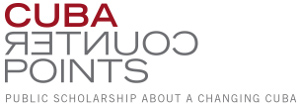FROM THE EDITOR
MAY 20th, 2015: WHY CUBA COUNTERPOINTS
Cuba Counterpoints has been long in the making, but only the announcement of the Castro-Obama accords on December 17th, 2014 awakened the urgency to carry it through against all odds…
It has been exactly twenty years since I first set foot in Cuba as an exchange student from the University of Chicago. I found a capital city that was bleak, which I had to traverse on a borrowed Forever and almost-empty stomach; I became even skinnier than I already was. But that summer of 1995, when I did little more than wander around and seemingly waste my precious graduate student time, changed my life for the better. That trip set me on a course that went beyond academia, to a mission of knowledge and understanding of not just the Cuban collage, but the human condition. Clifford Geertz’s famous mantra, that we anthropologists not only study villages, but we study in villages, became an obvious truth.
This project grows out of an academic community, initially formed around a blog, and then a Facebook group,—EthnoCuba—that was the original vision of two anthropologists who built their careers along a two-decade journey from Chicago to Havana to California. Over the years, we were able to form a transnational academic community with a distinct identity: not only united in its scholarly focus on Cuba, but in common experiences navigating the always idiosyncratic Cuban, and for many of us also U.S., bureaucracy. Both Cuban scholars and Cubanists from around the world claimed a space aside international tensions and extreme ideological positions. We did not build bridges. That task belonged to—our forebears, who are still inspiring us now. We created informal spaces for joint thinking and writing and talking and playing. In this sense, Cuba Counterpoints represents an inscription. It comes at a time when our friends and colleagues on the island are slowly but surely accessing the Internet, and it is our hope that they will join us in greater numbers in the coming months and years.
All of us involved in the making of this journal are committed to a plural space from which to think beyond nations about the issues of our time —from environmental concerns, to power imbalances, to sentimental longings, to political tactics, to notions of right and wrong – as they are experienced by people and communities that hold some idea of “Cuba” as a historical and cultural referent. Yet not only do we aim to shed light on social and cultural processes embedded in Cuba, but also to understand them more generally, as expressions of a humanity without borders.
There is another agenda at play. And that is the widespread preoccupation that we scholars of many disciplines share about our public invisibility, and the seeming irrelevance of the humanities and the “soft” social sciences for public policy, international relations, global finance, and all the arenas where decisions of planetary consequence take place. Thus this digital publication is an experiment in more ways than one. It offers a space to think about an old national idea that once became paradigmatic of freedom and liberation for some, and of oppression and surveillance for others; a national idea that became one and the same with a political project, and in so doing transcended its own history and geography. But this webzine also seeks to address the so-called crisis in the human sciences and the double-consciousness this has generated in us scholars: we see ourselves not through our own eyes, but through eyes that do not see us. Our goal sounds awfully ambitious, but as one contributor of this inaugural issue puts it, the only way to start is at the bottom.
Cuba Counterpoints is a collective project. There are many individuals who have participated in this pregnancy and who are here sharing this birth. This project would not have been possible without every single person in the editorial collective, the editorial board, and the editorial staff. Four people, however, deserve special praise for a support that has been intense, not only material but also emotional; and these are Linda Rodríguez, Jacqueline Loss, Ana López, and—in the final sprint—Sandra Abd’allah-Alvarez. We, and that includes every member of this team in every section (Hereafter, Legibles, Memories, Off the Press, Screens, Planet Red, Translation Magic, and others to come in the next few weeks), hope to open up conversations rather than set ideological agendas. We aim to counter stereotypes, like the prevailing idea that revolutionary Cuba has stood outside capitalism, or that Miami, as the exile capital, is its hyperrealist opposite, or that Afro-Cuban religion commands a homogeneous constituency easily aligned with race, or that Google can do when it comes to language translation. We endeavor to highlight the diversity of the Cuban experience as well as of the diverse experiences of Cuba. It is impossible to bind society, culture and country as one except through the sovereign power of a state. We plan to break that image into many fragments and perhaps put them back together to generate questions, musings, smiles, theories and more. We plan to have fun and hope that you, reader, will stay with us.
— Ariana Hernandez-Reguant, Editor. May 20th, 2015

Logo by Alejandro Barreras
